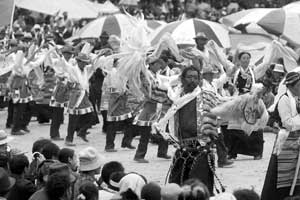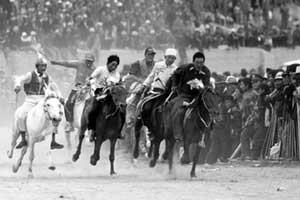After years of looking at picture books and postcards and listening to the
tales of those who had been there, I had become a big fan of Tibet's
breathtaking landscapes and unique culture.
So it was great anticipation that I set off for the snowy lands last month
for my first visit. But I was also nervous travelling to a very tight schedule.
We began in Lhasa, capital of the Tibet Autonomous Region.
We wanted to make it to Gyantse, the small ancient city in Xigaze Prefecture
in southwest Tibet. The historic seat hosts the famous Dama Festival, a five-day
jamboree of theatre, horse and yak racing, archery, dancing and singing.
Farmers, herdsmen and locals flock to the city's streets to join in the party
which has a history of at least 500 years.
We spent 12 hours bumping along a winding road from Lhasa but the endurance
was worth it because we spent the last two days of the colourful, exciting event
socking up the carnival atmosphere.

A group of dancers dressed in their festival best march
through the crowd. |
The Dama Festival is held each year usually on July 20-25. We arrived at
midnight and made for our hotel to ensure an early rise the next morning.
The Dama Festival
We were told by the tour guide that the next day we would see the final
stages of the horse racing, followed by a massive costume parade, an
awards-giving ceremony and the closing ceremony.
After a hasty breakfast, we went to the flat area near the Dzong, or the old
fort, which is the main venue for the festival. We arrived there at about 8
o'clock, hoping to find an advantageous position with a good view for the
racing.
We were somewhat surprised however, to find that thousands of race-goers had
already occupied the hills near the race ground and that hundreds of tents were
erected in the woods and on the grassy area around the race track. But no wonder
this event was proving to be the most popular of the long carnival.

Gallant riders join the horse race at the Dama Festival held in
Gyantse in late July. |
The Dama Festival literally mean "archery on horseback" in Tibetan. For many
years, the festival was held over five to seven days taking place from the 10th
to the 28th day of the fourth month as dictated by the Tibetan calendar, locals
told us.
But in 1996, it was changed to the Gregorian calendar and was held in July.
The reason was July was considered the slack period for farming. The festival
was originated in the area and was part of a noble and religious ritual in
ancient times.
According to local records, Gyantse Prince Dharma Raodain Gungsangpo
officially launched the festival in 1408.

